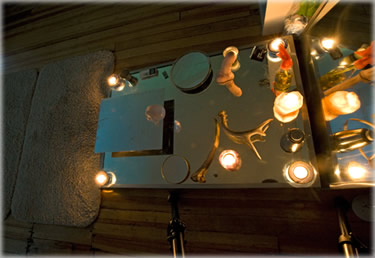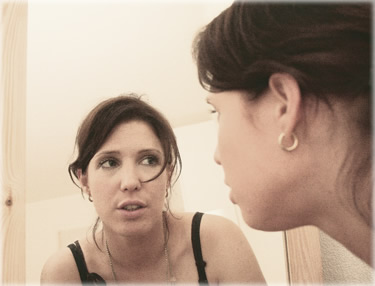Hello — Unfortunately, Rob Moore has had to suspend his column for the foreseeable future. If you know of someone who regularly writes about sexuality and relationships from a perspective that might be a good fit, please comment below. Thank you! — Amanda P.
Category Archives: Welcome

A Friendly Reminder About Rationality
The world is changing fast, too fast to keep up with.
Like me, I am sure you’re concerned that it’s not changing in entirely positive ways. People are on edge; there is a tide of fear that comes in and out regularly, seeming to get higher every time; and many people are wondering where rational thought went.

Photo by Jeff Bisti.
Part of where it went is out the window, as the Internet came in and took over our lives and our society. The Internet, so amazing in so many ways, is shortening attention spans, and turning the world into a kind of shared hallucination.
There seems to be neither time nor space for depth, for reflection or for careful thought. We are drowning in an ocean of superficiality and nonsense.
Planet Waves is one place where we’re keeping the lights of sanity on. We devote ourselves to honest, thoughtful and life-affirming astrology.
We provide a refuge in times of crisis, chaos and confusion. Planet Waves FM, my weekly music and talk program, provides a sane, calm environment where thousands of people tune in every week.
We are preserving the integrity of the printed word, and of ideas. We believe in ethics, which means never stooping to “clickbait” or fear tactics, or making promises we cannot keep.
We hold ourselves to the increasingly rare standard of making sense. Go ahead. Call us old-fashioned.
We do all of this without advertising or corporate sponsorship. You know who we answer to (you); this means you have a clear, uncluttered space to read and reflect.
We need your help to keep doing this.

Calling Emily Doe
Thursday night June 9, the day of the conjunction of Uranus and Eris in Aries, our theater company The Medea Project — Theater for Incarcerated Women — met for our weekly check in. I brought with me copies of Emily Doe’s statement to her rapist, which was published June 3 on Buzzfeed. As an exercise, each of us took turns reading it, paragraph by paragraph.

The majority of our company are HIV-positive, ex-offenders and recovering addicts. Our company provides a place for women to tell their stories as a means to explore how trauma got them on the path to disease and addiction.
We work with UC San Francisco’s HIV Women’s Clinic, which has done ground-breaking research confirming early trauma as a consistent marker for HIV infection later on in life for young women. The women of our company are survivors of some form of trauma — incest, child abuse, neglect, domestic violence and rape — which has played a part in disowning themselves.
As a dramaturg it is my job not only to help our company get their words right but to help them know what they’re talking about: to feel the words on the page as their own. When we started reading Doe’s statement Thursday night, the delivery of the relentless urgency for truth in Doe’s words did not rise through our voices until we got to this sentence: “I wanted to take off my body like a jacket and leave it at the hospital with everything else.” Our director Rhodessa Jones had us read those words as a group. Twice.
What is it to lose your body? Cassandra, a member of our company wrote something similar, recounting her own rape as a 12-year old child. She said that because of the rape, throughout her life, “I could feel my body and myself, and they were not the same.”
Like Doe, the dominion over her body was stolen. For Doe, at the moment of her rape, while unconscious. For Cassandra and the group, by circumstances of living while poor, black/of color and female in America. We all exist under the political, social and legal machinery that keeps us silent: the Daddy culture. Hell, if you look at all the ways state legislatures are finding to regard miscarriage as murder, you can see how far male power and privilege is trying to grope all of us using legislation. Daddy culture on steroids.
It’s hard to erase the kind of trauma Doe experienced and described. Millions of women around the planet carry a wound that is something similar or worse inside. She will have that the rest of her life, dealing with that deep in her cell memory like we do ours, which we attempt to explore. As women united under one roof at one table, we were in solidarity, our voices reading Emily Doe’s story, telling it as if it was our own — because it is. Emily Doe is part of our circle.
Ours is an anger so often triggered by unequal justice in prosecuting rape that most of us have gone numb. Justice for rape victims is not a given. A woman’s motives regarding consent in cases of her rape are always questioned. You’re to blame for someone raping you by your dress, your sexual history, your blood alcohol level, your hair, your makeup, your music selection and your proximity. Justice for women of color who are victims of rape and assault is rarer than dragon eggs. It happens, but the sightings are too infrequent to believe it truly exists.
The last time it did, it took the testimony of thirteen victims of Oklahoma City Police Officer Daniel Holtzclaw to convict him, sentencing him to 263 years in prison. Before he was caught, Holtzclaw raped 36 women — all poor and African-American — over a six-month period. He relied on their silence. He used the ‘power card’ of his badge and their race to pull them over on a traffic stop, subdue them and rape them. The abuse of power, privilege and authority there was clear cut.
Doe’s rapist, Brock Turner, was a white athlete and member of a fraternity in a prestigious university, Stanford, situated in the privileged and predominately white community of Palo Alto, California. Even when found guilty of all three rape counts by the jury, Turner’s privilege was clear cut. Trial judge Aaron Persky — a former athlete reputed for his leniency presiding over rape cases involving athletes — said, “A prison sentence would have a severe impact on him. I think he will not be a danger to others.”
The judge’s response was the ‘old boy’s club’, echoing words from Brock’s father pleading against the ruination of a young man’s life for “twenty-minutes of action.” Brock’s mother wrote a tearful letter detailing the young man’s character from childhood, echoing disbelief that such a good child could be capable of such violence. His father mourned Brock’s loss of appetite for a good steak, as if to eclipse the fact he treated a young woman’s body as a piece of meat. Turner’s parents and his defense team played the ‘privilege card’ after losing, and Judge Persky bought it.
For three charges of sexual assault the maximum sentence for anyone other than Brock Turner would have been 14 years. If the assailant wasn’t white and in the wrong state or county, it would have easily been double. Instead, Turner was sentenced to six months in jail with three years probation and will reportedly serve only three months of the light six-month sentence, with lifetime registry as a sex offender and attendance of a sex offender management program. He is expected to be released Sept. 2.
With the judge’s lenient sentence, Brock’s fraternity and family upbringing, his light sentence represents young white males gone bad yet sanctioned socially, culturally and legally, even with an actual guilty verdict by jury. No responsibility for the young woman’s life he ruined. Instead his social privileges and standing suffered. It was also reported that Turner had even texted pictures of Doe’s breasts to his friends in a group chat before he assaulted her. Those pictures, Brock’s trophy shots, were in police custody, but it’s unclear as to whether they made it to court.
Doe was correct in assessing her position as a woman whose alcohol consumption led her to passing out, making her a “wounded deer” and easy prey. She took full responsibility for that. When you look at the police photos of Brock’s face, you have to wonder: what was he feeling that a few drinks gave him license to unleash? Was it peer pressure for scoring a hook-up his freshman year at a fraternity? What did his parents do or not do in teaching Brock to understand the value of a woman’s consent? Or did they teach him that only certain people deserve his consideration and respect?
The questions don’t begin and end with Brock, his parents or the court. They start. The system of punishment for crimes of sexual assault in our state and the judicial system are ripe for review. Amazing this is happening while Uranus, the planet that shakes things up, is teamed up with Eris, which Eric writes is “the castaway aspect of the feminine: the one who is not invited to ‘the party’,” in the sign of Aries: the fighter leading the way around the wheel of the zodiac.
(UPDATED) This Wednesday, Santa Clara Congresswoman Jackie Speier will be reading Emily Doe’s statement on the floor of the U.S. House of Representatives. Beginning to end, it will take about an hour to read through.
I wish our company was there to help her read it. I hope some of you who can get C-Span watch it. Emily Doe’s rape was sanctioned all the way from the back of a dumpster to a courtroom in Santa Clara, CA. We women — poor, young, of color or not, here in the U.S. and around the world should know this story all too well — symbolically as well as actually.

Curious about what the epic Uranus-Eris conjunction means for you? Intrigued by the dance of Neptune and Chiron in Pisces? In our exciting new class with Eric Francis, The Astrology of Now, your questions will receive thoughtful and insightful answers — and you’ll have lots of fun in the process. You may sign up here.

Digital Literacy is Not About ‘Content’
Editor’s note: Andrew McLuhan is the grandson of media studies pioneer Marshal McLuhan, and a friend of Planet Waves. We’ll be featuring his writing on media criticism from time to time.
An Essay on an Essay
Last year (2015), The Atlantic published an article, ‘Digital Natives, Yet Strangers to the Web,’ about Rueben Loewy and his work. It stuck out for me, because it was an uncommon example of a person wanting to do more than teach how to use media, but wanting to help others learn how media use and change us.

Andrew McLuhan and son.
“Reuben Loewy is an educator, writer, and communications expert, who teaches Internet Studies and Journalism at Princeton Day School, and Internet Studies and Humanities at Princeton International School of Mathematics and Science. The realization that students are not being taught about the Digital Revolution led Reuben to establish Living Online Lab and develop a curriculum specifically designed to prepare students for the unique challenges (and not just the perils) of the digital age.” (source)
A year later, this new article by Loewy was brought to my attention. What happened was, I had written to him in support of his efforts, but he had only come across the email almost a year later. He passed the link to this latest article and asked for my thoughts on it. Be careful what you wish for!
So, though somewhat sleep-deprived (our second son Virgil is only two months old!) I have managed to put some thoughts together about his article, and where I would take the ideas a little further given my own ideals and goals for education in these matters. I wrote it in this style to be a little more objective than if I were writing it personally to him — which gave me the idea of publishing it here.
The following comments will make a lot more sense if you read Rueben Loewy’s article first.
Reuben Loewy: “Who’s Teaching the Digital Revolution?”
Thoughts on and Responses to Reuben Loewy’s ‘Who’s Teaching the Digital Revolution?”
The Mark Surman quote, which Loewy’s essay essentially leads with, is all about teaching and gaining proficiency in use:
“In today’s digital world, one core skill is conspicuously absent from our education system: web literacy. The ability to explore, create, and connect online isn’t an inherent part of curricula. That needs to change — web literacy deserves to be enshrined as the fourth ‘R’”.
Although Surman uses the word ‘explore’ he doesn’t mean explore the medium (environment) or the nature of it, but explore what it contains. He says ‘web literacy’ — and fair enough, he’s talking about proficiency in the use of the technology, which is after all the definition of ‘literacy’. And that is, quite literally, his business. But I do resent his would-be humanitarian tone. The statement does not bear scrutiny. What is humanitarian about creating more adept users without any thought to critical skills? Surman may have a broader vision that I give him credit for, but there is nothing in this statement to help anyone perceive more than what’s on the screen in front of them.
Literacy, without criticism, is useless.
Here is where I feel studies are quite lacking — it’s the focus on ‘media literacy’ without any great component of criticism. It’s the effects of media (the environments resulting from, accompanying, and created as a result of technology, their structure and effects), which are the major agents of change in people (physiologically) and societies. Much less so, the uses to which technologies are put. Teaching or advocating media literacy without media criticism is not getting us anywhere. Indeed, it’s holding us back. Literacy, without criticism, is useless.
Loewy then steps beyond the Surman quote and speaks of teaching “students to become critical and engaged citizens of the world they now inhabit.” Being critical and engaged are often mutually exclusive, but that aside, recognizing ‘the world they now inhabit’ as a vastly complex and changed environment is important, and Loewy outlines a few examples of that which need critical attention:
>>ethics, legal arguments around privacy and anonymity.
>>”free” online services are not free at all. [When something appears ‘free’, it’s generally the user being sold.]
>>algorithms in control — “the internet acts as an echo chamber instead of promoting thought diversity”
>>The need for students to be aware of cyberpsychology, the study of our online behavior.
>>”The list of topics that need to be added to our school curricula is long and significant.”
Good points, and areas which deserve attention. Loewy has obviously spent much time on the ground paying attention to his students and has done good work in addressing their needs and implementing solutions. He also obviously wishes to do more than he currently is able to. I have the advantage of being outside that system so I can shoot my mouth off. Loewy and others have more of a challenge, and more courage, working within the system to affect change. To be clear, while I feel he (and others in similar positions) could go further, I don’t blame them for not doing so, and I congratulate them for what they do on a daily basis.
I think many people feel that school curricula and teaching methods need addressing. One of the main topics or categories I feel is missing in schools is the training of perception, the teaching and use of tools for students to examine the nature of new technologies and the environments which they create — environments of services and disservices which simultaneously subtly yet drastically (paradoxically) change self and society. Time spent learning to use technologies is time wasted if it doesn’t include confronting their effects. We need to help students to develop the ability to step back from technology in order to be able to see what it’s doing; to raise their heads above the water long enough to know they are submerged.
— Beyond Tech Bling —
Loewy asks “How have we allowed our school curricula to fall so far out of step with the society they are supposed to reflect?” But if you apply the questions of the paragraph preceding to any older technology like television, radio, or any other, the question becomes not ‘how have we fallen so far out of step’, but ‘when will we start to examine the present?’ Because it is certainly not unique to our age that we are unwilling to confront the present on its own terms.
He is quite right in pointing out that people are under the impression that the presence of technology in the classroom seems to give people the mistaken belief that there is something progressive going on. As long as the emphasis is on uses and not effects, it’s nothing but razzle-dazzle, as empty and old-fashioned as it is shiny and new.
“How can we help students learn to navigate this new digital ecosystem?” asks Loewy. “Our goal should be to educate students so that they may function as responsible, ethical, informed, and critical members of society, both on and offline.”
Again, I would say that students need tools to study not only ‘the new digital ecosystem’, but all media. There are pre-digital media worth examining to shed light on the present, as there will be new media and a post-digital era. Too much focus on ‘digital’ media risks myopia and an inability to see the larger picture, and what comes next. I don’t disagree with many of Loewy’s teaching aims and objectives. My main criticism is of a slightly narrow focus. My own bias, to McLuhan media criticism, makes me favour a more general set of tools to study a wider variety of media rather than focus on digital and get bogged down.
— Mentor, not Monitor —
“The best filter is the one between our students’ ears, says Ribble.”
Indeed. And the best tools are the organs of perception, the faculties and senses. These need training. Training in discrimination, discernment. Observation, experimentation. Where is this in any media/technology-based curriculum? How can we expect students to learn anything new if they don’t know how to perceive anything new, or how to actually learn and not simply be taught?
“We need to work toward changing our approach to the digital work — moving from one of containment to one of engagement.”
I would modify Loewy’s statement. At this point, you can probably guess how I would rephrase it: ‘we need to work toward changing our approach to media literacy, moving from one of containment and engagement to one of observation and objective criticism of not just the content and uses but the form structure and effects’. I feel that Loewy is almost there, but doesn’t quite pull the trigger.
The “digital native myth” — that kids are inherently able to use digital technology, are born to it, is indeed backward thinking. In fact, technology is engineered for the lowest common denominator, so that it’s so simple a child can seem to have technological superpowers. It’s not so much that the new generations are amazingly adept and gifted, it’s that the devices are purposely designed for the simplest operation.
It is not impossible to consider the implications of technologies before they become consequences, but to suggest that is to suggest accountability for the effects and consequences of technologies.
“…we also need to provide professional development for teachers and workshops for parents.” Quite. We also need to get the message of the media (which is total change) to the people who are doing us the backhanded service of bringing all these technological marvels into being, making them so easy to use, and so hard to observe beyond their uses. A little forethought. It is not impossible to consider the implications of technologies before they become consequences, but to suggest that is to suggest accountability for the effects and consequences of technologies.
While I personally would have gone a bit further, Loewy has written an article which is a call to action that I greatly appreciate. It is way ahead of most of the conventional approaches, and firmly on the road past simple literacy and toward criticism and understanding and action.
/ / / / / / / / /
More on Reuben Loewy and his work here. A discussion forum has recently been added to the site, and I know he and his colleagues would love to hear from you if you have ideas and thoughts to share, or are able to support their work in some other manner. We need more like this.
Andrew McLuhan
Picton, May 25, 2016.
This article was written in response to a request for feedback from Mr. Reuben Loewy, whose work I admire. Thanks to Mark Reale for editorial advice.
As always, I’d love to hear from you. Comment here or reach me viaandrew@umeom.com

Curious about what the epic Uranus-Eris conjunction means for you? Intrigued by the dance of Neptune and Chiron in Pisces? In our exciting new class with Eric Francis, The Astrology of Now, your questions will receive thoughtful and insightful answers — and you’ll have lots of fun in the process. You may sign up here.
Publishing Schedule Update
Due to technical difficulties, Len Wallick’s column will not be appearing today. Please look for his Friday column later this week. — Amanda P.

Talking About Our Revolution
Puerto Rico has just voted in the Democratic primary, and on Tuesday, California and New Jersey votes are anticipated to confirm — for better or worse — Hillary Clinton as the Democratic nominee to run against Donald Trump. Relinquishing ground-level field reporting on presidential primaries, I now have to ask, “How the hell did we get here?”

The juxtaposition of the two nominees is a precise picture of the political divide we’re at in America today: a career politician and a millionaire business executive. Both of them raise questions in the public’s mind about their roles in the past, their positions in the present and at the very least their integrity. Both represent what the other side hates the most.
Delving deep into our public dissatisfaction, yes, government has failed us. Various corporate interests control how government functions, allowing corporations their free rein over the planet. That lack of functioning affects all our lives. Congress, mostly bought by private interests, has done us few favors.
There are enough out there who have built up their institutional power, step-by-step, to achieve the aim of a non-functioning government. By and large, they have almost succeeded. Congress is unable to pass even meager legislation. It is almost always close to failure in approving the federal budget every year. Good legislation sits in Congress and rots. The Senate is shirking its Constitutional duty by continuing to ignore its advise-and-consent role in affirming Justice Scalia’s replacement on the Supreme Court. Cases now languish on the docket, or are referred back to the lower courts.
So much of the system has NOT worked in its basic function. It has failed the working poor and the poor. It is also failing the middle class, and when you fail the middle class here and everywhere, revolution is not far behind. We have forgotten the human role government plays, and the gears of government have frayed. As long as we can still have elections, it will be all about saving us from ourselves — our government.
We’re watching a widened political and social breakdown. Political discourse — where people discuss and argue the actual merits of policy decisions — has deteriorated to toxic levels, fueled by the Internet. What Mrs. Palin opened in 2008 and what the Tea Party furthered in 2010 were the floodgates of ignorance, and the celebration of a lack of information.
Personal opinion is fact. Bigotry, xenophobia and misogyny naturally ensue. Multiply that by the speed of a tweet and we have a political discourse that is far from polite disagreement. We’re at siege against the lowest parts of ourselves. And the world watches in dismay.
Each subsequent election from here on out we may see more of the same — Trump worse, not Trump-lites. The political discourse has been coarsened enough, the threshold for reasoned thought — the bar — has been lowered enough that we’ve dug ourselves deep into a trough. How much more ignorance, brutality and xenophobia can we bear?
On that, I have to hand it to the Republicans. The Republicans of Richard Nixon’s days seem more ‘normal’ and civil than today. They’re today’s Democrats. Now today’s Republican party is ceding its power while being taken over by a mob. A natural evolution.
With Pluto in Capricorn on its march towards the revolution of Pluto in Aquarius, how we’re heading to that revolution is clearly on us. Maybe we should look deeply at how much of our own power we’ve handed over in various ways on a daily level. To what extent have we not taken in the needs of others alongside us? How buried are we in our phones, selectively parsing through feeds that we’re interested in, and not watching the news where other parts of the world burn?
How much have we let our anger and fear take over our decisions? How much have we relied on a leader to cure everything and not taken on personal leadership ourselves?
Revolution is more than a political slogan. It is a word not to be taken lightly. Yet it is sorely needed here, not only politically. How afraid are we of facing our own demons that we’re promoting the world’s biggest bully — Donald Trump — as president of the United States? Why do we think we need this in the first place? Perhaps the first blow against the lowest aspects of ourselves may be this election; and if she wins, getting Hillary to STAY left instead of listing right, politically and militarily. She better heed that, with the much-needed 10 million votes that Sanders supporters can provide.
I have no idea how this is going to play out. It’s the first time in my life to see something like this: a republic seriously considering a dictator for the White House. And as a child of the Sixties, I have seen a lot.
But because of that, I have seen the better angels of our nature rise to the occasion under worse conditions. Time to put on our running shoes. Clock is ticking. It took us more than 16 years to get here, and we’re gearing up for the next eight years under powerful stars to turn things around — which is what a revolution does — because the race is on.

Muhammad Ali Dies at 74: Titan of Boxing and the 20th Century

Muhammad Ali standing over Sonny Liston in 1965 in their second fight. Ali was declared the winner in that fight and retained the world title. Credit: John Rooney/Associated Press.
By ROBERT LIPSYTE | The New York Times
Muhammad Ali, the three-time world heavyweight boxing champion who helped define his turbulent times as the most charismatic and controversial sports figure of the 20th century, died on Friday in a Phoenix-area hospital. He was 74.
His death was confirmed by Bob Gunnell, a family spokesman. The cause was septic shock, a family spokeswoman said.
Ali, who lived near Phoenix, had had Parkinson’s disease for more than 30 years. He was admitted to the hospital on Friday with what Mr. Gunnell said was a respiratory problem.
Ali was the most thrilling if not the best heavyweight ever, carrying into the ring a physically lyrical, unorthodox boxing style that fused speed, agility and power more seamlessly than that of any fighter before him.

Archive Pick: The Sacred Space of Self
Note: Eric originally published today’s archive pick in the members’ issue of Planet Waves on Oct. 22, 2010. At the time, Vesta was in Scorpio. Vesta now in Gemini conjunct the Sun and Venus is bringing its themes (such as devotion) to the forefront of consciousness; meanwhile, Mars just retrograded into Scorpio today, plunging us into the realm of instinct and desire. — Amanda P.
Dear Planet Waves Reader:
Of the mysteries of ancient Rome, the vestal virgins stand out as one of the most intriguing. Who were these women, who served half a lifetime tending the sacred fire, taken between ages six and 10, and maintaining celibacy through 30 (or more) years of service to the goddess?
 |
|
Ritual fire in the Chironian, devoted to Vesta, Rosendale, NY. Photo by Eric Francis – Book of Blue.
|
They not only tended the city hearth, keeping its flames burning around the clock; for many generations they were present at every state function, standing as guardians on behalf of the goddess Vesta, who defended the city. Philosophers and emperors, including Cicero, revered them as central points of integrity for the empire, without whom Rome would surely fail.
Vesta, the goddess of the hearth, is rarely depicted in classical art; I’ve personally never seen a representation. At the center of her temple was not a cult statue or idol, but rather a flame. She is the incarnation of the goddess as fire; the living spirit of the element.
We have the stories of the vestals , actual women who did her work. They have names and histories: Aemilia, Licinda, Fabia, Aquilia Severa and of course, Coelia Concordia, the last head of the order, who was present when the Temple of Vesta was closed in 391 when Emperor Theodosius I banned pagan practice in the empire. She stepped down in 394. Theodosius was the last emperor under whom the empire was politically unified, and the Sack of Rome occurred just 14 years later. Perhaps Cicero was right. Of that event, St. Jerome wrote, “The city which had conquered the whole world was itself conquered.”
So, it would seem that the vestals and their ritual of constant devotion, at least symbolically, held a dimension of Rome’s integrity. They could put this energy into their devotion because they were freed from the responsibilities of household relationships and child rearing. They used their time studying and working in the service of their patron goddess and in turn, the society around them.
Notably, their history seems to predate Rome itself. Rhea Silvia, the mythical mother of Romulus and Remus, the founders of Rome, was said to be a vestal virgin; she claimed that the god Mars found her in a forest and seduced her, and she gave birth to the twins.
The Discovery of the Asteroids, and Vesta
In 1801, an astronomer discovered an orbiting body for the second time ever: that was Ceres. She was named for the goddess of agriculture. Two other asteroids were discovered soon after, Juno and Pallas.
In 1807, a German astronomer named Olbers discovered an orbiting body (at the time considered a planet), which he invited a colleague to name: that was Vesta. The brightest asteroid, comprising 9% of the mass of the inner belt, Vesta is supposedly visible without a telescope. We may wonder why the ancients, who had more time on their hands and much darker skies at night, did not note her wandering amidst the stars.
Vesta was the last asteroid discovered for 38 years. In 1845, Astraea was discovered, and the following year Neptune arrived. (This page provides a chronology of minor planet discoveries.)
 |
|
Temple of the vestals on the Roman forum, reconstructed by old Benito — one of his true gifts to Italy. Photo: Wikimedia Commons.
|
The discovery of the asteroids opened the potential for additional feminine archetypes in astrology; it took about 150 years for astrologers to get going using them, and they’re still considered something of a boutique item today.
As an astrological factor, I delineate Vesta as the experience of tending the inner hearth of creativity and sexuality. Her primary quality is devotion. She also represents an organizing principle. Think of how old houses were designed around the hearth as the focal point, and how the hearth is the center of the home’s functions. Vesta describes how we organize physical space, and in a similar way, psychic space. If we devote ourselves to tending our creative processes, to tending our inner flame, we have a way to organize consciousness that is then reflected in our values and our expression of life force.
People with a strong Vesta placement will almost always have an unusual expression of sexuality. By strong placement, I mean making many aspects, conjunct the Sun or Moon, or placed on one of the chart’s angles — such as the ascendant or midheaven. Their relationship lives will ‘just be different’ than the people they know: the typical models of romance don’t quite work, and they will wonder why. Many with this kind of placement will be inclined to think it’s a relationship issue, and feel inadequate; with Vesta, the root of the matter is often how sexuality is processed differently. There is the element of service, and Vesta may be incarnating in her expression as the sacred prostitute.
Sacred prostitution means offering oneself sexually in the service of creation, or the service of the goddess, as you wish, but often another person is the direct beneficiary. This is the kind of erotic sharing that is neither romantic nor casual. It’s not quite a mutual marriage. It’s part of what I call the Third Way. Many people have touched upon this energy, but in my experience relatively few experience it consciously or consistently. Typically, we lack the language and the support systems that make it feasible, and we tend to take everything — and everyone — much too personally.
With a strong Vesta placement, there can also be an element of celibacy: that is, of long gaps in sexual activity, which can be particularly confusing for young women who are accustomed to getting plenty of sexual attention. It helps to hear about Vesta and the particular type of devotion she describes. This will often key in memories of past lives spent as some kind of temple priestess.
You may read other interpretations of Vesta. Martha Lang Wescott, for example, notes the mundane qualities: an obsession with projects instead of people; emotional distancing; hard work and career demands; being impersonal; sublimation of other interests into the career or vocation; sacrifice/denial of self (by others/self) for a ‘greater goal’.
One author I read in The Mountain Astrologer circa 2000 said he noticed intense experiences of shame around Vesta placements, often relating to sex and inappropriate childhood sexual contact. I think all these concepts are valid, and some are rather perceptive, yet what is central to Vesta — and to any planet — is the process that unites all of the seemingly separate definitions.
With Vesta, that process involves the devotion of tending the inner hearth, be it for creativity, healing or service. At the center of our inner space is the fire of the soul that, in the complexities of physical life, rarely seems to burn on its own — it needs to be tended, loved and honored continually, so that it can thrive and flourish. When the flame is tended, the empire of our lives can thrive because there is integrity at the core of who we are, and fidelity to our purpose.
Venus Retrograde, and Vesta in Scorpio
We’re now experiencing an impressive collection of planets in Scorpio, which include Venus retrograde. Vesta arrived about a week ago, and on Saturday Venus retrograde and Vesta will be making a conjunction.
 |
|
Altar to Vesta. Photo by Eric Francis – Book of Blue.
|
Venus retrograde in Scorpio is an inner quest. Retrogrades imply internal orientation, movement of awareness toward the past, the search for something hidden, and an indication of what we turned off in childhood so as not to threaten our adult caregivers.
Scorpio implies sexuality and sexual themes. Certainly, we do a lot of shutting down here; even if our parents are not hung up on religiosity or their own untended injuries, few parents of prior generations (and, sadly, few today) encourage children to be comfortable with their sexuality.
Venus, one of two feminine archetypes from classical astrology, represents all facets of women, (usually) minus the maternal aspects covered by the Moon. Venus is the lover, the yin principle, the yearning kind of desire, and the most important indicator in the chart of what we value the most.
In Scorpio, Venus represents the powerful female desire nature, which some astrologers have associated with manipulation (associated with the power aspect of Scorpio). In a sense, Venus is out of place expressing desire directly; that is more the realm of Mars. Of course, this is in the opinion of the Holy See. If we want to know what sex was like before the Christians got hold of it and took over the topic completely, we need to study the bonobos. So far, no missionary has converted a single one. They are natural people. (You can read more about them, and what their lives say about humans, in an excellent new book called Sex At Dawn: The Prehistoric Origins of Modern Sexuality.)
These critters, our closest primate cousins (with whom we share 98.5% of our DNA), use sex as a way of maintaining peace and harmony. They know nothing of the jealousy and control suggested by Venus in Scorpio. Rather, they know that keeping the energy moving keeps their society in harmony, and provides a constant source of pleasure and bonding. (The authors of Sex at Dawn note that this is something more likely to occur in a matriarchal culture than a patriarchal one.)
 |
|
Blue Pool. Photo by Eric Francis – Book of Blue, NY.
|
With Venus retrograde, we have some introspection around the theme of jealousy and control (which exist as one concept). There are people who would argue that humans are incapable of learning or inventing something better than jealousy; that it’s this thing that will always get in the way of a more open-minded approach to loving relationships.
But emotional concepts run in trends; in our control-oriented phase of cultural history, we have a reverence for jealousy that is strictly optional, and based on insecurities that are optional as well. It’s all a matter of what we want. Incidentally, that something has already been invented: it’s called compersion, which you can think of as a plus-plus symbiosis in the emotional environment. Compersion is about allowing pleasure and emotional contact to exist in others, particularly the people you love. (Here is a keynote presentation I gave recently called Community and Compersion, which explains the concept.)
Venus retrograde is a quest to release jealousy and resentment in exchange for these other values. Indeed, this is a time to question what we value at all, and to examine the basis of our investment in relationships. Think of it this way: Venus is the ruler of Taurus. The sign opposite Taurus, therefore representing relationships, is Scorpio (counting signs, the 7th place). So Venus in her opposite sign will represent a relational involvement, and the retrograde is a kind of evaluation. What is the nature of this attachment, commitment or involvement? What are the definitions and boundaries involved, and how do I feel about them?
There is the question of attachment and how it so often substitutes for love; this one is rarely asked. More than anything, the Scorpio dimension will represent the deeper layers of the emotional bonds. With Venus retrograde, we now have a little more access to information than usual about how that connects to the past, and that emotional level.
Vesta: Devotion to Sexuality
It is rare to hear someone say that they are devoted to sexuality. Most places, to admit as much invites all kinds of judgments, or the fear of being judged. Instead, we admit to wanting relationships and to certain ideas about them; we’re obsessed with the notion of a soulmate or ‘the one’; we admit to wanting comfort and security; we admit to wanting to marry for money, or the devotion to some ideal form of love. But who unabashedly admits that sex is one of their devotions? What personal ad service allows you to check that off as one of your interests?
 |
|
Heather Fae as Vestal virgin. Photo by Danielle Voirin – Book of Blue, NY.
|
Vesta in Scorpio speaks to just that common sense notion. When we consider the nuances of sexuality, we have to remember the wider cultural background that infuses the discussion and makes it all the more meaningful. Devotion to sexuality is a positive frame of reference; an affirmation of the importance and beauty of one of the best things that life has to offer, and the source of all existence. Part of the devotion is to keeping a constructive attitude, which is of course challenging when we get so few positive messages — we need to look for those messages, and dialog with them.
Think of Vesta in Scorpio as the specifically sexual flame that we must tend in order to have a healthy, wholesome existence. This tending can come in many forms, including nourishing desire, expressing that desire, encouraging ourselves to be curious, and applying our awareness to the healing projects that we know would help us. Many of these involve trust; injured trust is one of the most significant factors that affects our sexual needs. Vesta in Scorpio is about nourishing trust — in particular the kind that’s not based on the illusion of control.
There may be matters of sexual health that require regular or even daily maintenance. This is something we often take for granted. But the privy parts (as William Lilly describes them in the first description of Scorpio published in English) get a lot of other activity, and they require special care. Part of that special care is a ‘use it or lose it’ factor where sex is concerned.
There is also the dimension of knowledge. How many books about sexuality have you read? Not relationship theory; rather, books that actually consider the sexual nature of what a person is. Most of us think we know a lot about sex, but where exactly does that ‘knowledge’ come from? Even Rachel Maddow, the first lesbian prime time news anchor, can’t utter the word ‘masturbation’ when it’s called for in a news story. Part of devotion to sexuality is a commitment to awareness and honoring different viewpoints that exist, and to stretching your viewpoint. One measure of the ignorance of our culture is the current culture war being waged on same-sex lovers. There is no way that would fly unless a lot of people were scared, judgmental, ignorant and (on top of that) feeing guilty about something. That’s because attack is a projection of guilt, especially where sex is concerned.
Finally, there is the matter of tending one’s own sexual truth. Every person has a unique sexual identity; we each need different things. Every person has a unique sexual orientation: there’s a lot more than L, G, B, T and Q. Most of us try to fit our sexual orientation into a pre-fab theory that was basically forced on us as the only option. The source of that one option is usually religion — hardly a place to go for enlightened information about sex and relationships. For example, we might be bisexual or polyamorous, and try to fit ourselves into a monogamous, heterosexual concept of a relationship.
Vesta in Scorpio would say: devote yourself to who you truly are, practice authenticity about your sexuality from day to day and hour to hour, and see what happens.
The Sacred Space Within
Sexuality is deeply personal, and you may be aware of an inner sanctuary that is not someplace you regularly invite others — even your lovers. You can think of that as represented by your Vesta placement, and under the current sky, Vesta in Scorpio. In that sanctuary, you’re free to desire who and what you want, to dream any dream and to tend the flame of what makes you hot, no matter what anyone might think.
 |
|
Caroline. Photo by Eric Francis – Book of Blue, Paris.
|
Now Venus is about to enter that inner sanctum. We could look at Venus retrograde contacting Vesta as a gesture of tending that inner flame. She is about to meet the element fire, and burn off what must be cleansed. Or, we could consider that Venus has returned to the sanctuary to relight her flame, or to connect with the passion of youth. Vesta represents young women, and Venus retrograde is about older women learning from the younger ones.
Think of Venus as entering the temple with her deepest needs and desires for healing and pleasure. Imagine that she is prepared to be absolutely honest in that space, to release what she doesn’t need, and to honor the core fire of her goddess within. This is a kind of initiation ritual, where the ordinary (Venus) makes contact with the extraordinary (Vesta) in a gesture of reconsidering one’s feelings, healing the past and, soon enough, moving forward with newfound passion. There may be an element of sacrifice involved — something that you don’t need that you give up, in order to accept what you truly need or want.
The sanctuary where this exchange takes place exists at the core of our identity. It’s the place where a transformative fire burns and identity is created from moment to moment. The embers have never gone out, and if we want to rekindle the flames, now is the time.
Yours & truly,
![]()
